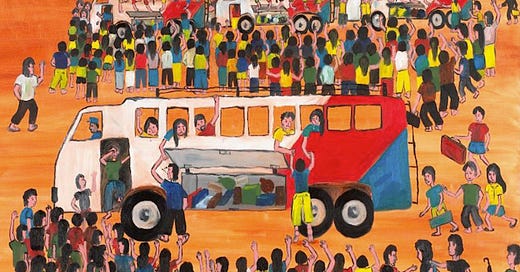As I sat at my computer searching for an insight to this week’s Gospel Mark 6: 30-34, and the phrase ‘When he (Jesus) went ashore he saw a great crowd, and he had compassion on them, because they were like sheep without a shepherd’ an email arrived in my inbox. As is so often the case - Jesus sent the insight. The email was from a ‘socio-economic researcher, advisor and project manager for Latin America & Caribbean and the subject read ‘Migration and Housing’.
I immediately realized that Jesus was sitting with me and directing me to liken the Gospel narrative to migration. I ‘Googled the topic’ and the following article appeared ‘The Past, Present, and Future of Human Migration’ in it I read ‘Today, more than 200 million people—most from Latin America, South Asia, and Africa—are migrants both within and across continents. Migration is now a big part of the global economy and of global society’
As I pondered the comparison, it became clear that the concept of being ‘like sheep without a shepherd’ resonated deeply with the plight of migrants. Just as the crowd in the Gospel sought guidance and compassion, so too do migrants search for a better life, often leaving behind everything they know in pursuit of hope and opportunity.
The sheer scale of migration, with over 200 million people on the move, highlighted the enormity of this modern-day exodus. I couldn't help but imagine Jesus standing among them, offering solace and direction. His compassion for the crowd in Mark 6:34 seemed to echo through time, challenging us to respond to the needs of the displaced and marginalized in our world today.
We are those disciples coming ashore with Jesus on the other side and confronting the crowd. The narrative says that Jesus felt compassion. As His followers, we are called to embody that same compassion in our actions. The crowd of migrants today mirrors the crowd Jesus saw—people yearning for a shepherd, for care and guidance.
The challenges they face, from displacement to finding safe housing, are modern echoes of ancient struggles for survival and dignity. It's our responsibility to see them not just as statistics but as individuals, each with their own stories and dreams. Like the disciples, we are called to step forward, not with indifference or fear, but with open hearts, ready to provide the support and understanding that Jesus modeled.
This moment challenges us to translate our faith into tangible actions of solidarity and love, reaching out to those in need just as He would. Besides the political answers, we disciples are called to play our part at a micro and macro level. We can advocate for fair and just policies that protect and support migrants, engage in community outreach to provide immediate assistance such as food, shelter, and clothing, and work to foster a welcoming environment in our communities.
On a personal level, we can volunteer our time, donate resources, and offer a listening ear to those who feel unheard. By building relationships and sharing the stories of those affected, we raise awareness and challenge misconceptions. Each act of kindness, no matter how small, contributes to a broader culture of compassion and justice.
In doing so, we honor the teachings of Jesus and also help to create a world where everyone, regardless of their journey, can find a place of belonging and hope.
NOTICE BOARD
I am so happy to announce that another person has joined the Benedictine Spirituality for Work and Home. This is an ideal spirituality for the 21st century. Journey with us by clicking on the link below and following the steps.





I love the link to the plight of migrants. May we be shepherds to those in need around us